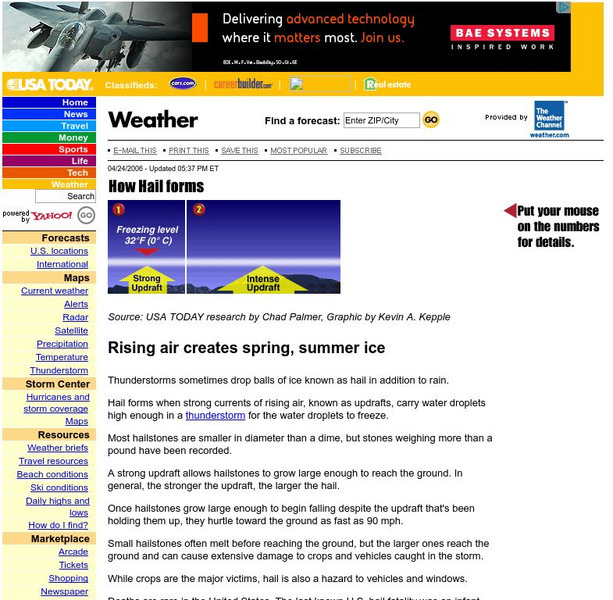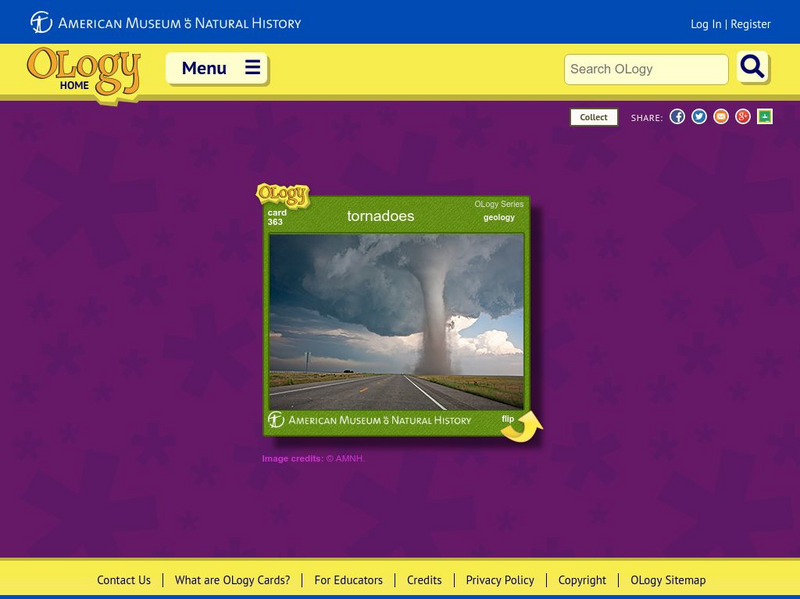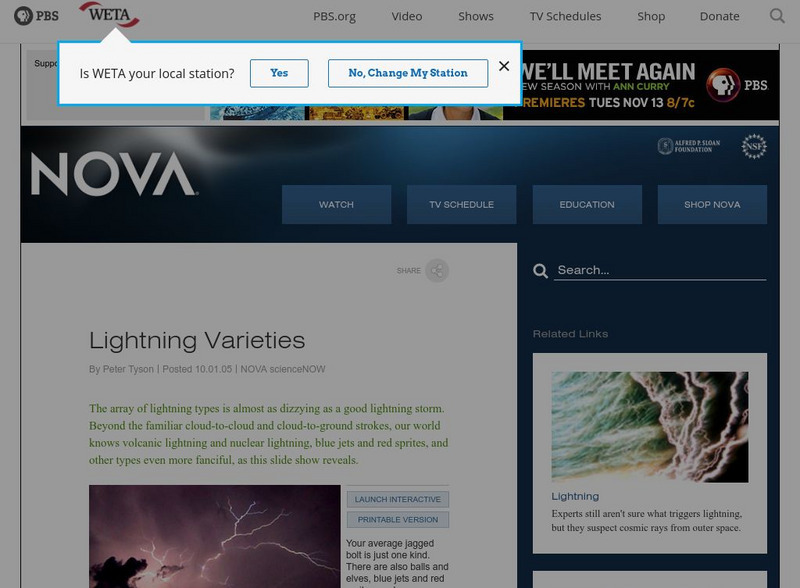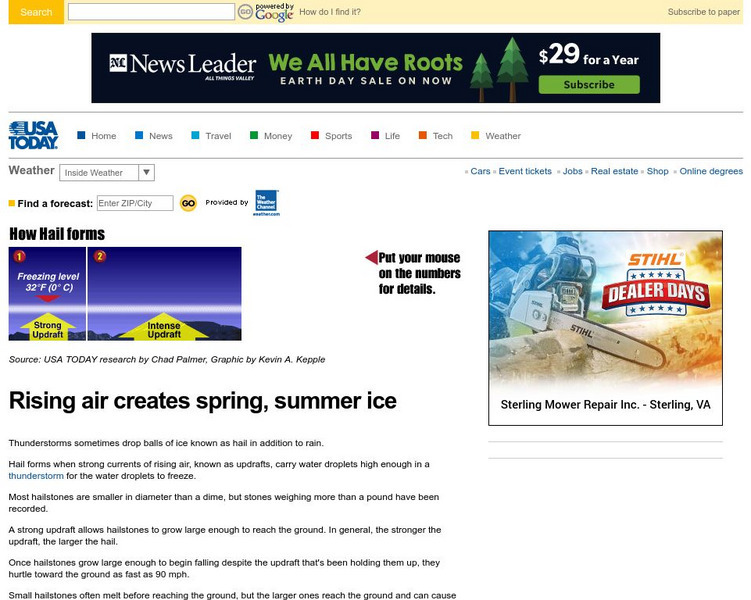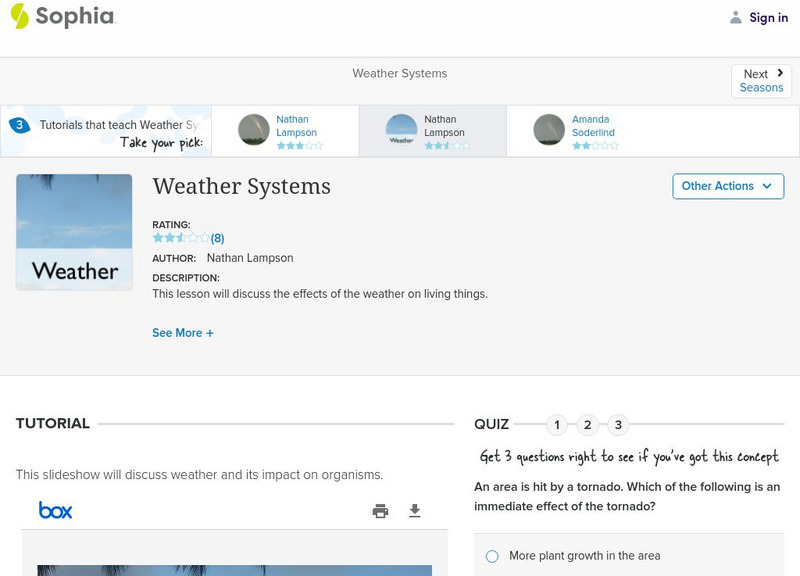NOAA
Noaa: National Weather Service: Hail
"Imagine a baseball dropped from an airplane flying at 30,000 feet; imagine that baseball reaching speeds of 120 MPH as it falls to the ground; and imagine you're under it!" How does hail form? How big can it get? Read more here about...
Science Struck
Science Struck: Different Types of Storms
Provides descriptions of a variety of storm types including wintry ones, ones with no precipitation, and very destructive ones. Discusses weather conditions that lead to these storms, precautions one can take, public alerts, etc.
Ducksters
Ducksters: Earth Science for Kids: Weather Glossary and Terms
Explore the concepts of climate, cloud, front, dew, fog, humidity, isobar, supercell, and thunderstorm on this site.
USA Today
Usa Today: Rising Air Creates Spring, Summer Ice
This article gives you basic information on hail. There are links at the bottom of the page to how hail forms, how updrafts breed hail and thunderstorms.
University of Illinois
University of Illinois Urbana Champaign: Severe Storms Modeling
This site features information on the severe storm computer modeling that meteorologists use to help them study severe storms.
Dan Satterfield
Dan's Wild Weather: Tornado Weather
What do you want to know about tornadoes? This site highlights the different aspects of tornadoes. Don't miss out on learning more about these wild storm patterns.
Dan Satterfield
Dan's Wild Weather Page: Clouds
Find out all about clouds and how they are formed at this site from Dan's Wild Weather Page. Nice photographs of different types of clouds enrich the site.
Scholastic
Scholastic: Study Jams! Science: Weather & Climate: Severe Storms
A slideshow and a short multiple-choice quiz on the topic of severe storms, some types, and the damage that they cause.
TeachEngineering
Teach Engineering: Tornado!
Students learn about tornadoes - their basic characteristics, damage and occurrences. Students are introduced to the ways that engineers consider strong winds, specifically tornadoes, in their design of structures. Also, students learn...
American Museum of Natural History
American Museum of Natural History: Tornadoes O Logy Card
Flip this interactive card to start learning about tornadoes, nature's most powerful storms. Answer multiple-choice and fact-or-fiction questions and review some fast facts about tornadoes.
Read Works
Read Works: Weather: Air Patterns
[Free Registration/Login Required] An informational text about wind patterns and how they relate to clouds, storms, and lightning. A question sheet is available to help students build skills in reading comprehension.
University of Wisconsin
The Why Files: Looking at Lightning
An introduction to the science behind lightning, its causes, and effects. If you follow links, there are also pages on the medical risks associated with getting struck by lightning.
PBS
Pbs Teachers: Nova Science Now Lightning: Lightning Varieties
Compare and contrast different types of lightning bolts. A substantial amount of information is provided here including pictures with descriptions for each type of lightning bolt. NOTE: The interactive is no longer available; Click on...
Other
Kean: Weather Systems [Pdf]
No scientific phenomena concern us as much as the daily evolution of weather systems. We live in a culture where weather, the state of the atmosphere at a given time and place,helps us define regional cultural variations. States such as...
Alabama Learning Exchange
Alex: Boom Boom Thunder!!
The focus of this lesson is for students to determine why thunder makes the "Boom" sound. Through hands-on activities students will become familiar with the sound thunder makes.
Alabama Learning Exchange
Alex: Are You Prepared?
Natural disasters come in many different forms. In order to be better prepared, students have to know the different types of disasters. In this lesson students will research natural disasters in order to create a brochure highlighting an...
PBS
Pbs Learning Media: Severe Weather
Observe various severe weather phenomena in this image gallery from WGBH. Weather is the combination of factors -- temperature, wind, snow or rain, and sunlight and clouds -- that happen in a specific place at a specific time. Sometimes...
National Endowment for the Humanities
Neh: Picturing America: Cole: The Oxbow [Pdf]
Analysis of Cole's famous landscape of a bow-shaped bend in a river conveys all the essential qualities that typify works by Hudson River school artists.
USA Today
Rising Air Creates Spring, Summer Ice
How does hail form? Where are hailstorms most common? What kind of damage can hail cause? Find answers to these questions and others in this brief article.
Sophia Learning
Sophia: Weather Systems: Lesson 2
This lesson will discuss the effects of the weather on living things. It is 2 of 3 in the series titled "Weather Systems."
Sophia Learning
Sophia: Weather Systems: Lesson 3
This lesson will discuss the effects of the weather on living things. It is 3 of 3 in the series titled "Weather Systems."
Sophia Learning
Sophia: Weather Systems: Lesson 1
This lesson will discuss the effects of the weather on living things. It is 1 of 3 in the series titled "Weather Systems."
Ducksters
Ducksters: Earth Science for Kids: Weather: Tornadoes
Explore tornadoes on this website! Kids learn about tornadoes including how they form, characteristics, types including supercell and waterspout, categories, and fun facts.
Other popular searches
- Thunderstorms Clapping
- Severe Thunderstorms
- Videos on Thunderstorms
- Thunderstorms and Rain
- Thunderstorms Model
- Thunderstorms and Lightening
- Summer Thunderstorms
- Viedos on Thunderstorms
- Thunderstorms 4th
- Earth Science Thunderstorms
- Webquest on Thunderstorms
- Thunderstorms Worksheets




